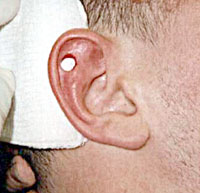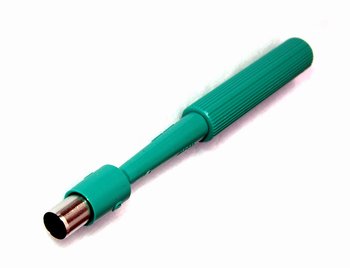Dermal punch
A dermal punch is like a round needle - think of it as a sharp, round cookie-cutter for skin. The medical industry uses them to take biopsy samples, but piercers use them to make round piercings which remove an actual piece of flesh. This tool is also utilized when performing a Punch And Taper Surface Piercing.
Cartilage piercings are apt to develop scar tissue, and because a dermal punch reduces the pressure that a piercing puts on the injured tissue, scarring risks are reduced. More importantly, cartilage piercings can be very difficult to stretch, and 'dermal punching' allows for the installation of a very large initial piercing (up to 8mm and beyond!)
Before doing a cartilage dermal punch, placing a small flashlight behind the area to be pierced can illuminate major blood vessels. This should be done both from the front and from the back. By doing this you can map out the blood vessels in the skin and decide upon a placement designed to cause the least amount of damage to surrounding tissues.
Smaller (6ga and below) dermal punches are healed just like normal piercings, but larger ones can be healed a little differently: After the piercing is performed, jewelry may be worn for the first few days to allow the tissue to seal, but after that, it can be removed. A piercing without jewelry in it heals MUCH faster. However, it is important to regularly check to make sure the piercing doesn't close!
Dermal punches are primarily used to perform cartilage piercings, punch and taper surface piercings and nostril piercings. They are not widely used for other types of piercings, because they remove a section of tissue, and this may limit stretching of the piercing in the future.

